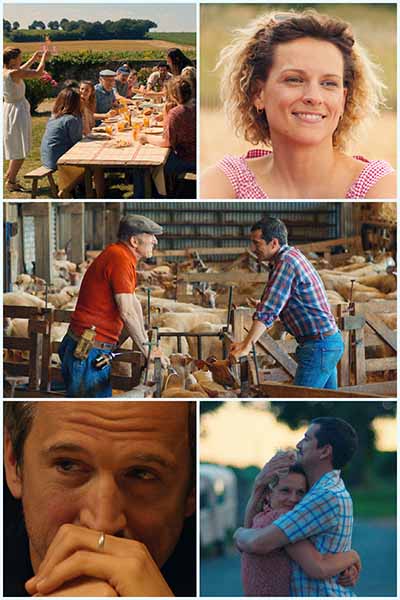 AU NOM DE LA TERRE/IN THE NAME OF THE LAND, France, 2019. Starring Guillaume Canet, Veerle Baetens, Anthony Bajon, Rufus, Samir Guesmi, Yona Kerven. Directed by Edouard Bergeon. 103 minutes. Rated M (Mature themes and coarse language)
AU NOM DE LA TERRE/IN THE NAME OF THE LAND, France, 2019. Starring Guillaume Canet, Veerle Baetens, Anthony Bajon, Rufus, Samir Guesmi, Yona Kerven. Directed by Edouard Bergeon. 103 minutes. Rated M (Mature themes and coarse language)
A solemn title, sounding like a legal document. And, in a sense this moving drama does offer a legal challenge to the state, the situation of farmers and those who work the land, who work in the name of the land – and are destroyed by it.
This is a personal film from documentary-maker, Edouard Bergeon. It is his memoir about his own father and his life as his father’s son. At the end, the gravestone for the central character, Pierre Jarjeau, transforms into the actual headstone of the director’s father. And, consolidating this and our response to the story and the characters, some video glimpses of his actual father.
The action opens in 1979, an enthusiastic opening when the young Pierre (Guillaume Canet who has charmed audiences with some devil-may-care performances, now very serious as the farmer working his land and then overwhelmed by it) returns from a stint in the American West, in Wyoming, ready to take over his father’s farm. He is also about to get married to Claire (Belgian actress, Veerle Baetens – excellently supportive). His father, played by character actor, Rufus, is a stern man, not readily conceding his property to his son. Financial deals are done, the father and his wife movie into a small house, leaving the property to Pierre and his wife.
In some ways this presents something of an idyll of French farming, zest and enthusiasm, full of hope.
Then there is a transition to the 1996. The farm is in full swing, a great deal of machinery, crops, hay bales, and a building devoted to the cultivation of goat kids. But, the situation is precarious, financially. Where are many scenes of actual work on the farm, in the vein of the director’s documentary skills and detail, there is a growing sense of uneasiness. Pierre and Claire have been married for 17 years, Pierre is getting older, balding. The couple have a son, Tom, and a daughter cool, Emma. There is also a handyman who helps on the farm.
The film does show a number of domestic scenes, the family devoted to each other, Christmas gifts, especially a power bike for Tom who is a keen rider. Meals, happiness in each other’s presence. And this, despite the continued criticism of Pierre’s father who turns up now and again to help with the work but always has something negative to say.
Pierre, always an enthusiast despite financial difficulties which Claire, as a professional accountant, has to keep track of. Visits to the bank, requests for loans, restructuring of plans, and the setting up of a new building to house thousands of chickens in season to be followed by the goats.
Life was not meant to be easy, nor is it on the farm, potential for the new equipment to malfunction, the danger of fire, the continued heavy demands with the chickens, the goats, the ploughing and harvesting of the fields. It takes its toll.
The latter part of the film is quite grim, Pierre and some physical collapse, some mental collapse, all in the name of the land and his determination to keep working, that work is the only solution.
Sadly, this is not the only solution in a final quote at the end of the film indicates that every two days a French farmer commit suicide.
While the action takes place in the latter part of the 20th century, and is portrayed vividly on screen, the farm life, the family life, the town life, given the first two decades of the 21st century, there is still a great challenge for agricultural life in France and appreciation of its toll on those who work there.
Palace
Released 10 December
Peter Malone MSC is an associate Jesuit Media